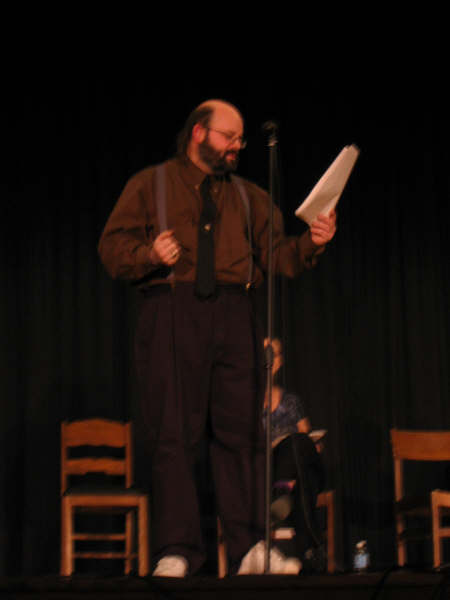I just listened to a podcast called, The Moth, which features original stories told live, without notes. Usually, the Moth’s mic is reserved for everyday, or reasonably everyday people, relating some interesting and unusual event from their otherwise non-public lives. This Moth, however, starred Garrison Keillor.
Listening to Keillor’s melodious, oh so familiar voice always makes me a little inspired and slightly melancholy. I know that he was largely responsible for bringing Minnesota Public Radio back from the dead back in the 70’s. I also know he’s been quoted before as saying that radio drama is as dead as typewriter ribbon sales. I have yet to verify that quote, but it has been repeated more than once so it at least deserves consideration. If true, the quote raises a lot of questions about Keillor’s motives for doing Prairie Home Companion. I suppose he might see himself as a kind of monk, keeping the lost tablets of a dead civilization alive. So maybe he isn’t so keen on discovering new tablets being written by punks half his age, and that explains his apparent indifference to new audio theater. Or, he might just not yet know we exist.
For those of us engaged in creating new audio theater, Keillor’s a bit of an enigma. He is the one cultural touch point we all can use to explain ourselves to the curious (Oh, like Lake Woebegon? I see.) And yet his indifference to the future of the art form is disturbing and a little sad. Some of it might be age and technology. On the Moth, he did indicate he listened to the podcast on CD’s, leading one to believe that he is iPod-less. But it’s also very possible that Garrison Keillor sees himself as the final great playwright in the tradition of Fletcher, Obler and Corman. Because it seems for all his celebration of the art form and it’s potential to reach an audience in ways no other performing art can, he seems to think it will all die with him. That’s a shame.
Imagine what we could do with him on our side.
Listening to Keillor’s melodious, oh so familiar voice always makes me a little inspired and slightly melancholy. I know that he was largely responsible for bringing Minnesota Public Radio back from the dead back in the 70’s. I also know he’s been quoted before as saying that radio drama is as dead as typewriter ribbon sales. I have yet to verify that quote, but it has been repeated more than once so it at least deserves consideration. If true, the quote raises a lot of questions about Keillor’s motives for doing Prairie Home Companion. I suppose he might see himself as a kind of monk, keeping the lost tablets of a dead civilization alive. So maybe he isn’t so keen on discovering new tablets being written by punks half his age, and that explains his apparent indifference to new audio theater. Or, he might just not yet know we exist.
For those of us engaged in creating new audio theater, Keillor’s a bit of an enigma. He is the one cultural touch point we all can use to explain ourselves to the curious (Oh, like Lake Woebegon? I see.) And yet his indifference to the future of the art form is disturbing and a little sad. Some of it might be age and technology. On the Moth, he did indicate he listened to the podcast on CD’s, leading one to believe that he is iPod-less. But it’s also very possible that Garrison Keillor sees himself as the final great playwright in the tradition of Fletcher, Obler and Corman. Because it seems for all his celebration of the art form and it’s potential to reach an audience in ways no other performing art can, he seems to think it will all die with him. That’s a shame.
Imagine what we could do with him on our side.


0 Comments:
Post a Comment
<< Home